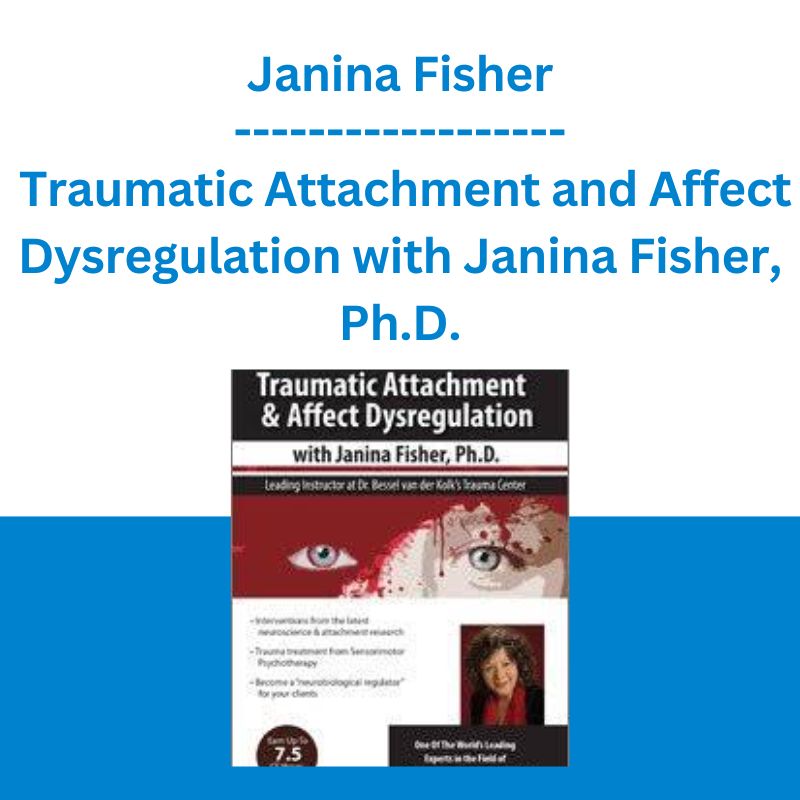*** Proof of Product ***

Exploring the Essential Features of “Janina Fisher – Traumatic Attachment and Affect Dysregulation”
Description
- Interventions from the latest neuroscience & attachment research
- Learn from a master of Trauma, Attachment and Affect Dysregulation
- Trauma treatment from Sensorimotor Psychotherapy
- Become a “neurobiological regulator” for your clients
Attachment failure is inevitable and inescapable in trauma clients, leaving behind a lasting imprint on all future relationships, including the therapeutic one. Janina Fisher, Ph.D., international trauma expert and instructor at Dr. Bessel van der Kolk’s Trauma Center, will teach you how to make therapy and the therapeutic relationship a haven of safety.
You will learn how to first address your client’s disorganized attachment, traumatic transference, and disturbances in the capacity to self-regulate preventing therapy from becoming stagnant or unstable. Explore the effects of traumatic attachment from a psychobiological perspective and learn to work with both the somatic and relational legacy of attachment interventions drawn from neuroscience and attachment research as well as Sensorimotor Psychotherapy, a body-centered talking therapy for the treatment of trauma.
Utilizing a combination of lecture, video, and experiential exercises, Dr. Fisher will provide you with a neurobiologically-informed understanding of the impact of trauma on attachment. Understanding the latest somatic interventions for challenging trauma-related relational patterns, and how to use ourselves as “neurobiological regulators” of the client’s dysregulated emotional and autonomic states, will help you improve treatment outcomes with your traumatized clients.
Speaker
Janina Fisher, PhD
Janina Fisher, PhD, is a licensed clinical psychologist and former instructor at The Trauma Center, a research and treatment center founded by Bessel van der Kolk. Known as an expert on the treatment of trauma, Dr. Fisher has also been treating individuals, couples and families since 1980.
She is past president of the New England Society for the Treatment of Trauma and Dissociation, an EMDR International Association Credit Provider, Assistant Educational Director of the Sensorimotor Psychotherapy Institute, and a former Instructor, Harvard Medical School. Dr. Fisher lectures and teaches nationally and internationally on topics related to the integration of the neurobiological research and newer trauma treatment paradigms into traditional therapeutic modalities.
She is co-author with Pat Ogden of Sensorimotor Psychotherapy: Interventions for Attachment and Trauma (2015) and author of Healing the Fragmented Selves of Trauma Survivors: Overcoming Internal Self-Alienation (2017) and the forthcoming book, Working with the Neurobiological Legacy of Trauma (in press).
Speaker Disclosures:
Financial: Dr. Janina Fisher has an employment relationship with the Sensorimotor Psychotherapy Institute. She is a consultant for Khiron House Clinics and the Massachusetts Department of MH Restraint and Seclusion Initiative. Dr. Fisher receives royalties as a published author. She receives a speaking honorarium, recording royalties and book royalties from Psychotherapy Networker and PESI, Inc. Dr. Fisher has no relevant financial relationships with ineligible organizations.
Non-financial: Dr. Janina Fisher is on the advisory board for the Trauma Research Foundation.
Target Audience
Counselors, Social Workers, Psychologists, Psychotherapists, Therapists, Marriage & Family Therapists, Addiction Counselors, Case Managers, Nurses, Other Helping Professionals that work with children
Objectives
- Identify and discuss trauma-related attachment patterns.
- Describe disorganized attachment behavior and its effects on affect regulation.
- Explain the theory and practice of Sensorimotor Psychotherapy.
- Utilize Sensorimotor Psychotherapy techniques to address attachment and trauma-related issues in psychotherapy.
- Describe somatic interventions to address preoccupied, avoidant, and disorganized/unresolved attachment styles.
- Employ interactive neurobiological regulation to address affect dysregulation.
Outline
The Neurobiology of Attachment Formation
- An evolutionary view of attachment patterns
- Early attachment as a somatic experience
- Attachment styles and brain development
- Autonomic arousal and affect regulation
- Effects of traumatic threat on the body and nervous system
Disorganized Attachment and Trauma
- When the source of safety is the source of threat
- “Frightened” and “frightening” caregiving
- Disorganized-unresolved attachment as survival defense
- Statistical predictor of Borderline Personality Disorder
- Long-term impact on affect regulation/dysregulation
Effects of Disorganized-Unresolved Attachment on Transference
- Phobia of therapy and the therapist
- Traumatic transference and disorganized attachment
- Affect dysregulating effects of psychotherapy
- Safety and dysregulation
- Induction of the therapist as affect regulator
Stabilizing Traumatic Attachment Responses
- Mindfulness-based treatment models
- Introduction to Sensorimotor Psychotherapy
- Increasing regulatory ability in therapyNonjudgmental self-observation and awareness
- Non-attachment to thoughts, feelings, and memories
- Ability to shift focus
- Developing somatic resources in the relationship
- Right brain-to-right brain communication
The Therapist as a Neurobiological Regulator
- Dysregulated states and psychotherapy
- What does it mean to be a ‘neurobiological regulator’?
- Lessons from attachment research
- Minimizing negative affect
- Maximizing positive affect
- Playfulness, acceptance, curiosity, and empathy
- Successful experiences of feeling regulated while in relationship
Please see the full list of alternative group-buy courses available here: https://lunacourse.com/shop/









